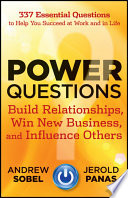

Questions are the foundation of effective communication and understanding. In 'Power Questions', the authors emphasize that asking the right questions can lead to deeper insights, foster relationships, and drive innovation. Questions can open up dialogues that reveal hidden opportunities and challenges. By shifting the focus from providing answers to asking questions, individuals can engage with others more effectively, whether in personal or professional settings. This approach encourages active listening and creates an environment where ideas can flourish. The authors argue that powerful questions not only elicit information but also inspire action and change.
Continue readingThe book categorizes questions into various types, each serving a distinct purpose. Open-ended questions encourage expansive thinking and creativity, while closed questions can help clarify specific details. Probing questions dig deeper into a subject, revealing underlying motivations and concerns. Reflective questions prompt individuals to think critically about their experiences and decisions. By understanding the different types of questions and their impact, readers can tailor their inquiries to suit the context and objectives of their conversations, leading to more productive outcomes.
Continue readingAsking questions is a powerful tool for building rapport and trust in relationships. The authors illustrate how genuine curiosity can break down barriers and foster meaningful connections. When individuals ask thoughtful questions, they demonstrate their interest in others' perspectives and experiences. This practice not only enhances interpersonal relationships but also creates a collaborative atmosphere where ideas can be shared freely. The book provides examples of how leaders and teams can use questions to strengthen their bonds and improve communication, ultimately leading to better collaboration and results.
Continue readingEffective leaders leverage questions to guide their teams and drive performance. The book discusses how leaders can use questions to inspire and motivate their teams, encouraging them to think critically and take ownership of their work. By asking strategic questions, leaders can facilitate problem-solving, innovation, and accountability. The authors highlight the importance of creating a culture where questioning is encouraged, allowing team members to voice their ideas and concerns without fear of judgment. This approach not only empowers individuals but also leads to more informed decision-making and a stronger organizational culture.
Continue readingQuestions are essential in the problem-solving process, as they help identify the root causes of issues and generate potential solutions. The authors outline a systematic approach to using questions in problem-solving scenarios, emphasizing the need to ask clarifying questions to understand the problem fully. By framing questions around potential solutions, individuals can explore various perspectives and develop innovative approaches to challenges. The book provides frameworks and examples that illustrate how effective questioning can lead to more efficient and successful problem-solving outcomes.
Continue readingThe authors advocate for cultivating a questioning mindset to enhance personal and professional growth. This mindset involves being curious, open-minded, and willing to challenge assumptions. By embracing a questioning approach, individuals can continuously learn and adapt to changing circumstances. The book encourages readers to practice asking questions regularly, both to themselves and others, as a means of fostering growth and resilience. The authors provide practical exercises and reflections to help readers develop this mindset, making it a valuable tool for lifelong learning and improvement.
Continue readingThe book concludes with practical applications of power questions in various contexts, including business, education, and personal development. The authors provide actionable strategies for incorporating powerful questions into everyday interactions, meetings, and decision-making processes. By equipping readers with tools and techniques for effective questioning, the book empowers individuals to enhance their communication skills and achieve their goals. The emphasis on real-world applications makes the insights from 'Power Questions' accessible and relevant to a wide audience, encouraging readers to put these principles into practice.
Continue readingThe reading time for Power Questions depends on the reader's pace. However, this concise book summary covers the 7 key ideas from Power Questions, allowing you to quickly understand the main concepts, insights, and practical applications in around 24 min.
Power Questions is definitely worth reading. The book covers essential topics including The Importance of Questions, Types of Questions, Building Connections through Questions, providing practical insights and actionable advice. Whether you read the full book or our concise summary, Power Questions delivers valuable knowledge that can help you improve your understanding and apply these concepts in your personal or professional life.
Power Questions was written by Andrew Sobel, Jerold Panas.
If you enjoyed Power Questions by Andrew Sobel, Jerold Panas and want to explore similar topics or deepen your understanding, we highly recommend these related book summaries:
These books cover related themes, complementary concepts, and will help you build upon the knowledge gained from Power Questions. Each of these summaries provides concise insights that can further enhance your understanding and practical application of the ideas presented in Power Questions.